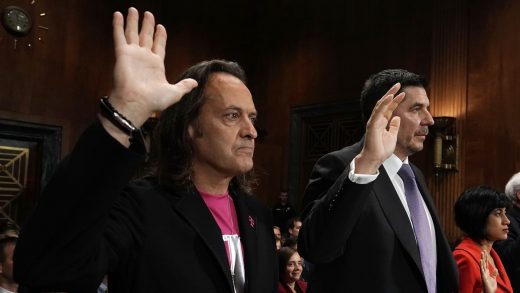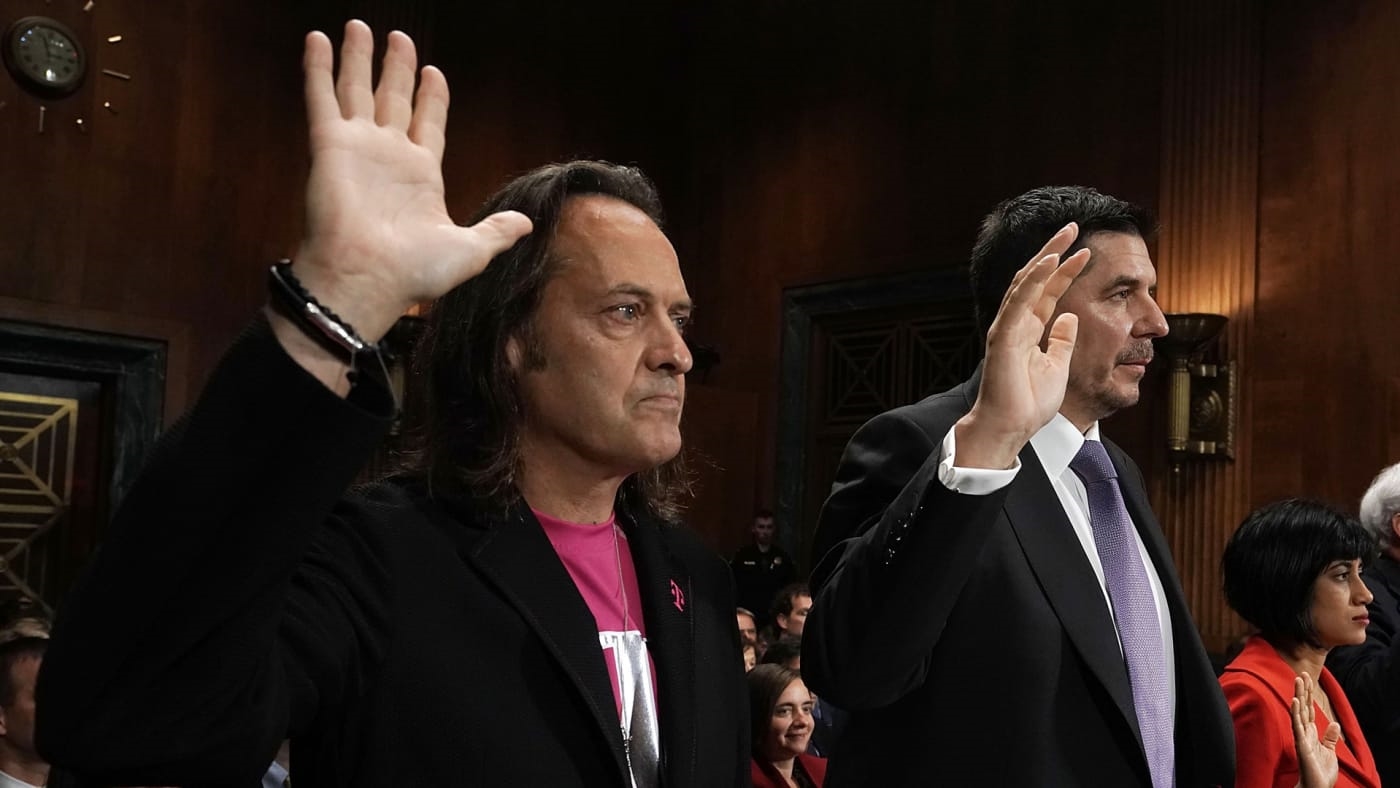There’s only one way for T-Mobile/Sprint to satisfy regulators
T-Mobile’s colorful CEO John Legere had a busy Wednesday. He appeared before Congress, energetically making the case for his company’s proposed $26 billion merger with Sprint.
And later in the day he was seen at one of President Trump’s properties, the Trump International Hotel just blocks from the White House, hanging out with his new influence-peddling buddy, ex-Trump campaign manager Corey Lewandowski. Later, Legere got in one of the elevators and went up, an action that isn’t possible without a room key, points out journalist Zach Everson.
With a merger pending that’ll need government approval, T-Mobile’s CEO John Legere is back at the Trump Hotel DC. Also Corey Lewandowski is here. And Lewandowski just went over to Legere’s table and they chatted. (Verified with my own eyes ????.)
— Zach Everson (@Z_Everson) June 27, 2018
How times change. During a stay at a Trump property in 2015, Legere got annoyed with the noise of street musicians outside his room and tweeted to Trump about it. Trump fired back: “T-Mobile service is terrible! Why can’t you do something to improve it for your customers. I don’t want it in my buildings.” The diva spat ended with Legere angrily announcing he was checking out of Trump’s hotel. That was back in 2015, before Trump became something more than a C-level celebrity.
Flash-forward to 2018 and Legere is praying that the Department of Justice or the FCC won’t block his company’s coupling with Sprint. It’s the biggest sell of Legere’s professional life.
By retaining Lewandowski, whose main service consists of arranging access to the president, T-Mobile signaled its willingness to play the influence game by Trump’s rules.
Making The Case
When Legere and Sprint executive chairman Marcelo Claure appeared before the Senate Judiciary Committee’s antitrust panel on Wednesday, their main goal was to leave the impression that the merger will create jobs and not harm consumers. (Such hearings are important inasmuch as Congress oversees the FCC, which, with the DOJ, must green-light the deal. But they’re more of a formality, a dog-and-pony show that allows lawmakers to appear tough on big corporations on the evening news back home in their districts.)
Ultimately T-Mobile and Sprint must convince the FCC that the deal is “in the public interest,” meaning it will not harm competition in the wireless market. They have to show the Justice Department that a merger would not constitute antitrust and ultimately make things tougher for wireless consumers.
This will not be easy. The merger of the #3 and #4 carriers in the wireless market will inevitably cause redundancies in the two companies’ workforces. Legere seemed to acknowledge this in the Senate hearing. The number of jobs eliminated would be about 10,000, as the two companies combine whole departments, call centers, network operations, and the like. The only real bright spot on the jobs front is the possibility that the combined company will bring some jobs back to the U.S. from foreign call centers.
The question of competition is also a sticky one. As a smaller wireless carrier it wasn’t surprising when T-Mobile attacked the industry’s twin titans AT&T and Verizon by offering lower-priced service and by dispensing with usurious long-term service contracts (the other wireless carriers were forced to follow suit). T-Mobile reveled in that insurgent role, dubbing itself the “Uncarrier” and launching a series of device and service freebies and discounts. Legere cast himself as the living embodiment of his company’s place in the market, dressing himself up in the bizarre (magenta and leather) accoutrements and attitude of a rebellious corporate man-child. He attacked AT&T and Verizon in videos and tweets, referring to them as “Dumb and Dumber” and “the pricks.”
Legere, decked out in his magenta plumage at the witness table, assured lawmakers that T-Mobile would still be head-to-toe rock-and-roll even after the hitch-up with Sprint.
“When we do this, AT&T and Verizon will be forced to react and follow our lead or we will happily take their customers and give them more value and better price,” Legere said. “Trust me, the New T-Mobile will not stop, we will be relentless.”
Two Outcomes
That played well, but there’s good reason to skeptical of Legere’s words. Consumer advocacy groups like Free Press suspect that reducing the wireless market from four to three competitors will ultimately lead to less innovation, poorer service, and higher prices. They may be right.
“In recent years, T-Mobile and Sprint have each exerted important competitive pressures on the wireless market, pushing each other and AT&T and Verizon to do things they otherwise wouldn’t — like offering uncapped data plans again and dropping burdensome contract requirements,” said Free Press CEO Craig Aaron in a statement. When T-Mobile is no longer a David and looks more like just another Goliath, and when Legere’s job as CEO is to maximize returns to his shareholders, why would T-Mobile continue to act like the market’s freewheeling underdog?
Wireless industry insiders see it differently. It is a fact that T-Mobile and Sprint are small players in a wireless market where being small makes it hard to survive. In the first quarter of 2018, Verizon had 151.5 million subscribers, AT&T had 143.8 million subscribers, T-Mobile had 74 million, and Sprint had 53.6 million. AT&T and Verizon, being larger, benefit from economies of scale in ways T-Mo and Sprint cannot. They buy more network equipment, for instance, but at lower prices. In the end this results in less overhead per subscriber served, which translates into better margins.
As subscriber counts grow, these advantages only increase. And since the market holds only a finite number of subscribers, this necessarily hurts the smaller players, which have to pay more to lure subscribers away from the big guys. Sprint’s Claure told members of Congress on Wednesday that his company, standing alone, is having trouble breaking even.
Which view will more closely match reality a year or two after a merger? In reality both will likely prove true. The merger will likely degrade competition in the wireless space over time, but it will also likely create a stronger single company with a much better chance of survival. The new company would instantly be roughly the size of Verizon and AT&T, with a subscriber share of about 29%. A period of “rationalizing” the two companies’ redundant people, facilities, and technology (The companies have said that $40 billion in “efficiencies”) could result in a more efficient and competitive company. What we don’t know is the balance of the two effects.
A Changing World
One expert told me that if the deal is framed as a pairing of two of the four national wireless carriers, it has little chance of making it past the regulators. It’ll set off antitrust alarm bells all over the Justice Department, the person said. This at a time when the Trump administration is trying to make a point of being tough on antitrust issues during a season of widespread consolidation in many industries.
That’s why Legere and Claure have been trying to describe the combined company as a new kind of entity that sells not only wireless service, but potentially home broadband service and a host of media in the future. Becoming that kind of company was the thinking behind AT&T’s recent acquisition of the media giant Time Warner. A combined T-Mobile and Sprint will very likely aspire to sell new kinds of broadband service like fixed wireless service for the home. Sprint owns a treasure trove of 5G wireless spectrum. That combined with T-Mobile’s considerable 5G spectrum holdings will pave the way for those.
Moreover, the new company will not just be competing with the other national wireless companies (AT&T and Verizon), but rather with any company that sells wired or wireless broadband and, increasingly, internet TV service over the top. T-Mobile has already telegraphed an interest in over-the-top video with its acquisition of Layer3 TV in late 2017. This could mean Comcast, Charter, Frontier, and Century Link–companies that are increasingly making a living by selling broadband service.
During the hearing, Senator Amy Klobuchar (D-Minn.) said she was skeptical that the combined T-Mobile and Sprint would be forced to raise prices for consumers after they incurred all the costs of merging and refocused efforts on beefing up their wireless networks. But she may have framed the question incorrectly. Barring any disastrous cultural implosion as the two companies merge, the pairing is in fact very likely to create “synergies” and push down network upgrade costs and operating costs. It would be surprising to see the new company immediately raise wireless charges after the completion of the merger and the establishment of the new brand. The thing to be afraid of, I think, is a gradual evolution toward a company that looks and acts like AT&T and Verizon.
I for one look forward to seeing Mr. Legere on a black and magenta stage, rock-and-roll blaring, paid T-Mobile employees cheering wildly, only to announce a half-percent increase in shareholder dividend or a bold new wireless plan that throttles download speeds at 10GB per month. If T-Mobile and Sprint are allowed to merge, Legere’s rebel patter will start to sound even more hollow than it already does.
Fast Company , Read Full Story
(28)



